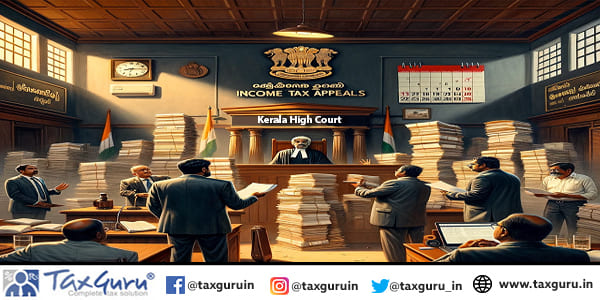Case Law Details
Joshy P. Mathew Vs CIT (Kerala High Court)
Introduction: In a significant development, the Kerala High Court, in the case of Joshy P. Mathew Vs Commissioner of Income Tax, addressed a delay exceeding ten years in the resolution of income tax appeals. The court mandated an expedited review and disposal of the petitioner’s appeals, highlighting the imperative for timely adjudication in tax matters.
Background: The genesis of this legal dispute traces back to a search and seizure operation conducted under Section 132 of the Income Tax Act on the petitioner’s premises on 10.01.2008. Following the operation, assessments for the years 2002-03 to 2008-19 were undertaken under Section 153A read with Section 143(3) of the Act, leading to the issuance of assessment orders (Exts P1 to P7) on 28.12.2009. Dissatisfied with these orders, the petitioner sought redress through appeals, which were initially dismissed, prompting further appeal to the Income Tax Appellate Tribunal. In 2013, the Tribunal remanded the case back to the first respondent for reconsideration in accordance with a prior judgment by the Kerala High Court.
Legal Contention and Court’s Decision: The petitioner’s primary grievance revolved around the extensive delay in the re-adjudication of his appeals by the first respondent, a delay that spanned more than a decade. During this period, the department pursued enforcement based on the contested assessment orders. Recognizing the undue hardship faced by the petitioner, the Kerala High Court directed the first respondent to finalize the appeals within a four-month timeframe. Additionally, the court issued a temporary prohibition against any coercive actions to enforce the demand arising from the disputed assessment orders during this period.
Implications of the Judgment: This judgment is pivotal in underscoring the judiciary’s dedication to ensuring that administrative processes within the tax domain are conducted efficiently and within a reasonable timeframe. It brings to light the adversities taxpayers endure due to administrative delays and underscores the importance of resolving tax disputes expediently. The court’s directive for a swift resolution reinforces the principle of fairness and due process in tax administration, setting a precedent for timely disposition of appeals.
Conclusion: The Kerala High Court’s intervention to mandate the expedited disposal of income tax appeals in Joshy P. Mathew Vs Commissioner of Income Tax after an extensive delay highlights the judiciary’s active role in ensuring efficient tax administration. This ruling is expected to foster a more responsive and deadline-oriented approach to the adjudication of tax appeals, benefiting both the tax authorities and taxpayers by promoting a more just and efficient resolution of tax disputes.
FULL TEXT OF THE JUDGMENT/ORDER OF KERALA HIGH COURT
The present writ petition has been filed seeking the following reliefs:
a) Issue a writ of mandamus or any other appropriate writ, order or direction, to direct and to consider and dispose ext.P8 to P14 Appeals pending on its file.
b) A writ, order or direction, directing the respondents not to initiate any further proceedings on the basis of the impugned assessment orders, (Exts.P1 to P7) during the pendency of the aforesaid appeals, (Exts.P8 to P14) without disposing of the same.
c) Grant such other reliefs as are deemed fit and proper in the facts and circumstances of the case.
d) Petitioner also prays that this Hon’ble Court may be pleased to dispense with the translation of the documents produced in the vernacular language.

2. A search was conducted under the provisions of Section 132 of the Income Tax Act at the premises of the petitioner/assessee group on 10.01.2008 and proceedings were initiated for assessment of the petitioner’s income under Section 153A read with Section 143(3) of the Income Tax Act, 1961 for the assessment years 2002-03 to 2008-19. On conclusion of the proceedings, Exts P1 to P7 assessment orders came to be passed under the provisions of Section 153A read with Section 143(3) of the Income Tax Act on 28.12.2009. The petitioner aggrieved by the assessment orders in Exts.P1 to P7 had filed appeals before the 1st respondent. However, the 1st respondent dismissed the appeals vide orders in Exts.P8 to P14 dated 02.02.2010.
3. Against the said appellate orders passed by the 1st respondent, the petitioner filed 7 appeals before the Income Tax Appellate Tribunal being appeal Nos. ITA 283 to 289. The Income Tax Appellate Tribunal set aside the orders passed by the 1st respondent in Exts. P8 to P14 and remanded the matter back to the 1st respondent vide order dated 27.09.2013 for fresh consideration in the light of the judgment passed by this Court in P.(C.) No.34655 of 2011.
4. The learned counsel for the petitioner submits that more than ten years have passed since the matter was remanded back to the 1st respondent by the Income Tax Appellate Tribunal vide order dated 27.09.2013, however, till date appeals have not disposed of by the 1st In the meantime, the respondents are enforcing the demand in pursuance to the assessment orders in Exts.P1 to P7. This Court on the last date of hearing i.e, 05.01 .2024 required the Senior Standing Counsel for the Income Tax Department to inform the Court regarding the time would be required for disposal of appeals in Exts. P8 to P14 pending before the 1st respondent.
5. Ms. Susie B. Varghese, learned Senior Standing Counsel on instruction submits that the 1st respondent would requires at least four months time to finalize the appeals in Exts.P8 to P14.
Considering the said stand of the respondents, the present writ petition is disposed of with direction to the 1st respondent to finalize the appeals in Exts.P8 to P14 expeditiously, preferably within a period of four months. For a period of four months, no coercive measure to be taken against the petitioner to enforce the demand in pursuance to Exts.P1 to P7 assessment orders.





